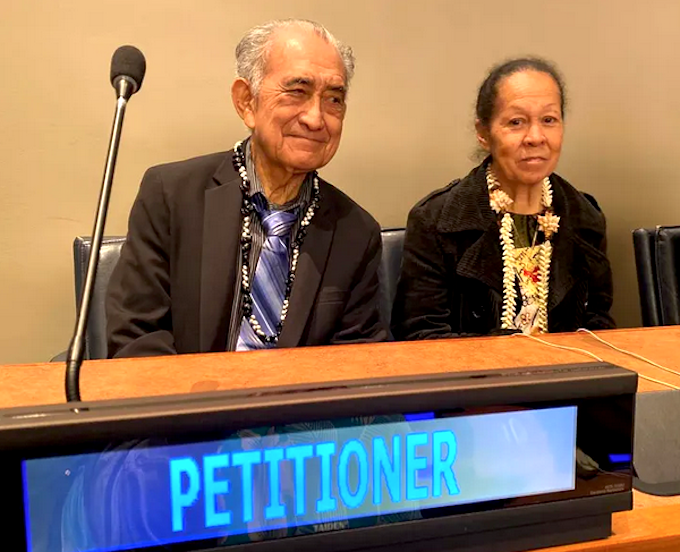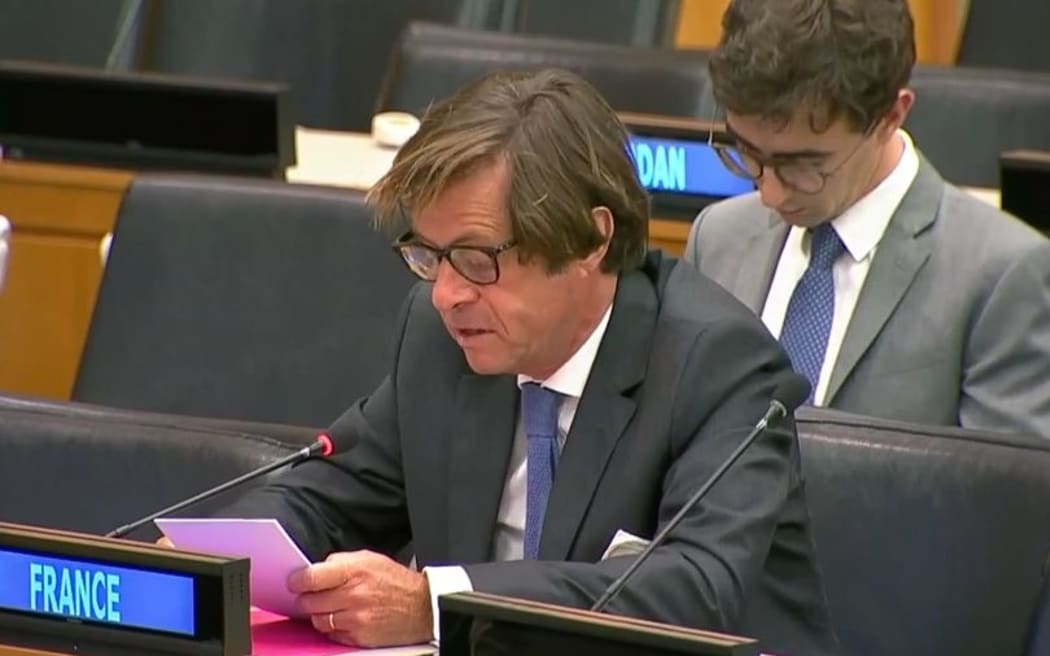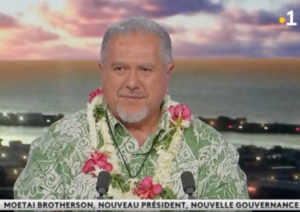
ANALYSIS: By Patrick Decloitre, RNZ Pacific French desk correspondent
After 10 years of non-attendance, France turned up to this week’s French Polynesia sitting of the UN Special Committee on Decolonisation (C-24) — but the French delegate did not deliver the message that pro-independence French Polynesian groups wanted to hear.
French Polynesia was re-inscribed to the United Nations (UN) list of non-self-governing territories in 2013.
Pro-independence leader Moetai Brotherson, President of French Polynesia, came to power in May 2023.
- READ MORE: Macron warns of ‘new colonialism’ in Pacific, but clings to French ‘colonies’
- Other France in the Pacific reports
Since then he has claimed he received assurances from French President Emmanuel Macron that France would end its “empty chair” policy regarding UN decolonisation sessions on French Polynesia.
President Macron apparently kept his promise, but the message that the French Ambassador to the UN, Nicolas De Rivière, delivered was unambiguous.
He declared French Polynesia “has no place” on the UN list of non-autonomous territories because “French Polynesia’s history is not the history of New Caledonia”.
The indigenous Kanak peoples of New Caledonia, the other French Pacific dependency currently on the UN list, have actively pursued a pathway to decolonisation through the Noumea Accord and are still deep in negotiations with Paris about their political future.
French public media Polynésie 1ère TV quoted the ambassador as saying: “No process between France and French Polynesia allows a role for the United Nations.”

The ambassador also voiced France’s wish to have French Polynesia withdrawn from the UN list. At the end of his statement, the Ambassador left the room, leaving a junior agent to sit in his place.
This was just as more than 40 pro-independence petitioners were preparing to make their statements.

The C-24 session started on Tuesday morning.
This week, French Polynesia’s 40-plus strong — mostly pro-independence delegation — of petitioners included the now-ruling Tavini Huiraatira party, members of the civil society, the local Māohi Protestant Church, and nuclear veterans associations and members of the local Parliament (the Territorial Assembly) and French Polynesian MPs sitting at the French National Assembly in Paris.
It also included President Moetai Brotherson from Tavini.
French position on decolonisation unchanged
For the past 10 years, since it was re-inscribed on the UN list, French Polynesia has sent delegates to the meeting, with the most regular attendees being from the Tavini Huiraatira party:
“I was angry because the French ambassador left just before our petitioners were about to take the floor [. . . ] I perceived this as a sign of contempt on the part of France,” said Hinamoeura Cross, a petitioner and a pro-independence member of French Polynesia’s Territorial Assembly, reacting this week to the French envoy’s appearance then departure, Polynésie 1ère TV reports.
Since being elected to the top post in May 2023, President Brotherson has stressed that independence, although it remains a long-term goal, is not an immediate priority.
Days after his election, after meeting French President Macron for more than an hour, he said he was convinced there would be a change in France’s posture at the UN C-24 committee hearing and an end to the French “empty chair policy”.
“I think we should put those 10 years of misunderstanding, of denial of dialogue [on the part of France] behind us [. . .]. Everyone can see that since my election, the relations with France have been very good [. . . ]. President Macron and I have had a long discussion about what is happening [at the UN] and the way we see our relations with France evolve,” he told Tahiti Nui Télévision earlier this week from New York.
President ‘for all French Polynesians’ – Brotherson
President Brotherson also stressed that this week, at the UN, he would speak as President of French Polynesia on behalf of “all [French] Polynesians, including those who do not want independence today”.
“So in my speech I will be very careful not to create confusion between me coming here [at the UN] to request the implementation of a self-determination process, and me coming here to demand independence which is beside the point,” he added in the same interview.
He conceded that at the same meeting, delegates from his own Tavini party were likely to deliver punchier, more “militant”, speeches “because this is Tavini’s goal”.
“But as for me, I speak as President of French Polynesia.”
Ahead of the meeting, Tavini Huiraatira pro-independence leader Oscar Temaru said that “It’s the first time a pro-independence President of French Polynesia will speak at the UN (C-24) tribune”.
Temaru, 78, was French Polynesia’s president in 2013 when it was reinscribed to the UN list.
Speaking of the different styles between him and his 54-year-old son-in-law — Moetai Brotherson is married to Temaru’s daughter — Temaru said this week: “He has his own strategy and I have mine and mine has not changed one bit [. . .] this country must absolutely become a sovereign state.
“Can you imagine? Overnight, we would own this country of five million sq km. Today, we have nothing.”
French Minister of Home Affairs and Overseas Gérald Darmanin wrote on the social media platform X, previously Twitter, earlier this week: “On this matter just like on other ones, [France] is working with elected representatives in a constructive spirit and in the respect of the territory’s autonomy and of France’s sovereignty.”
Darmanin has already attended the C-24 meeting when it considered New Caledonia.
The United Nations list of non-self-governing territories currently includes 17 territories world-wide and six of those are located in the Pacific — American Samoa, French Polynesia, Guam, New Caledonia, Pitcairn Island and Tokelau.
This article is republished under a community partnership agreement with RNZ.








































